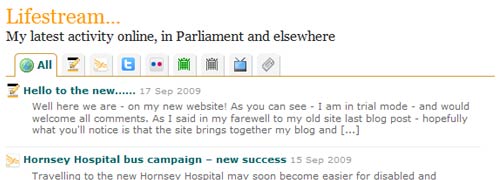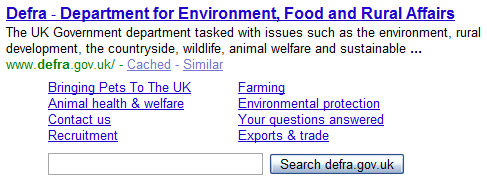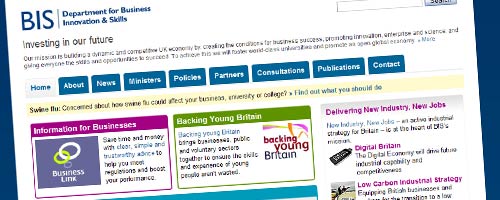
We’re proud to unveil our latest creation: a new website/blog for Lib Dem MP Lynne Featherstone (or try this link if the DNS hasn’t rolled over for you yet). It’s taken a good few months, and has thrown up challenges on a scale I haven’t had to tackle before. But equally, it presented several opportunities for cheeky innovation, and as you’ll know by now, I can’t say ‘no’ to those.
A bit of background. Lynne started blogging in October 2003, making her one of the first MPs to do so – although she wasn’t an MP at the time. And in fact, she specifically credits her website as a factor in her winning the Hornsey and Wood Green seat in 2005 (on a 14% swing). She was also the first MP to use Twitter, more or less. And she’s in charge of the LibDems’ online campaigning strategy. No pressure then.
We had five and a half years’ worth of blog posts in Blogger, with over 2,000 user comments, to be migrated to WordPress. Oh, and 2,000 hand-coded press releases from the local party branch, to be integrated too please. Plus accounts on Twitter, Flickr and YouTube. And what about her contributions to other websites? Not to mention her activity in Parliament?

So the grand concept of the site is the use of a tabbed ‘lifestream‘ as the homepage. The initial view lists her last 10 actions, no matter where they happened – including Early Day Motion signatures, which required me to write my own scraper. Then, if you want to see her activity on one of those specific areas, you just click the appropriate tab. It’s all driven by RSS; the tabs are powered by ajax; the lists are generated by a cron for obvious reasons.
We’ve also made some first steps into Facebook integration. If you’re going to comment on the site, you can sign in with your Facebook credentials: this will pull your name and profile photo into the comment, and give you the option of adding an entry to your Facebook news-stream. I’ve used the official WordPress plugin, but it needed more tweaking than I probably expected, and didn’t always work reliably on all browsers. Let’s just say I’ll be keeping a close eye on it.
 I’ve also used Ordnance Survey’s OpenSpace API to create a clickable map of the wards which make up Lynne’s constituency, with the precise boundaries marked, and map detail down to individual building outlines. I shouldn’t need to explain why this might prove to have been an – ahem – interesting move. It’s ready, but we won’t be activating it immediately.
I’ve also used Ordnance Survey’s OpenSpace API to create a clickable map of the wards which make up Lynne’s constituency, with the precise boundaries marked, and map detail down to individual building outlines. I shouldn’t need to explain why this might prove to have been an – ahem – interesting move. It’s ready, but we won’t be activating it immediately.
The effort that’s gone into the issue and ward pages probably won’t be evident on the front end: you get a short summary, plus the latest posts tagged accordingly, plus any ‘blogroll’ links, plus – where relevant/available – the latest posts from other related sites or blogs, again pulled in via RSS. But crucially, all of this is done using standard WordPress functionality, in such a way that Lynne and her team can create new pages instantly. No (deep) tech knowledge required.
Naturally, it’s got all the sorts of functions you’d expect from a WordPress blog: sidebar widgets, paged comments, RSS feeds, decent SEO, etc etc. We’ve done pretty well in maintaining addresses from the old site: 50 to 60% of the URLs, at a guess, accounting for the vast majority of site traffic. And if you ignore the issues with Facebook’s custom markup language, everything (I think) passes HTML validation. Hooray!
There’s so, so many people to thank on this one. Jonathan Harris, who happens to be a constituent of Lynne’s, for the design work. Matthew Somerville for tweaking something for me within TheyWorkForYou, plus a couple of people within Parliament who tried to help me with EDM RSS through the proper channels, but ultimately couldn’t. Ex-LibDem tech supremo Mark Pack. Lynne’s staff and councillor colleagues for their early feedback. And Lynne herself for trusting me in the early stages, and encouraging me in the later stages when I didn’t necessarily trust myself.
Every site I do, I always try to do something innovative. This time, there are just so many things that I’ve never done before myself, or that I’ve never seen on a website in the same field. It’s been exhausting, occasionally terrifying, but great fun to do. And I can’t wait to see what happens next.




 I find it quite remarkable that we’ve made it to 2010 without TV debates becoming part of the British electoral process. How dare they refuse the electorate a neatly packaged opportunity to ‘compare the market’? (Sorry.) It shouldn’t be about whether each leader thinks it’s strategically advantageous to him or her. Doesn’t the electorate have an absolute right to expect those who wish to lead it to come before them, and present their case using the electorate’s preferred communication medium? And isn’t it reasonable, in a world where media profile is all, for those leadership candidates to demonstrate their competence in that regard?
I find it quite remarkable that we’ve made it to 2010 without TV debates becoming part of the British electoral process. How dare they refuse the electorate a neatly packaged opportunity to ‘compare the market’? (Sorry.) It shouldn’t be about whether each leader thinks it’s strategically advantageous to him or her. Doesn’t the electorate have an absolute right to expect those who wish to lead it to come before them, and present their case using the electorate’s preferred communication medium? And isn’t it reasonable, in a world where media profile is all, for those leadership candidates to demonstrate their competence in that regard?
